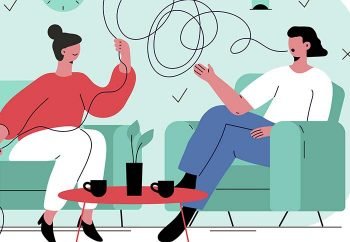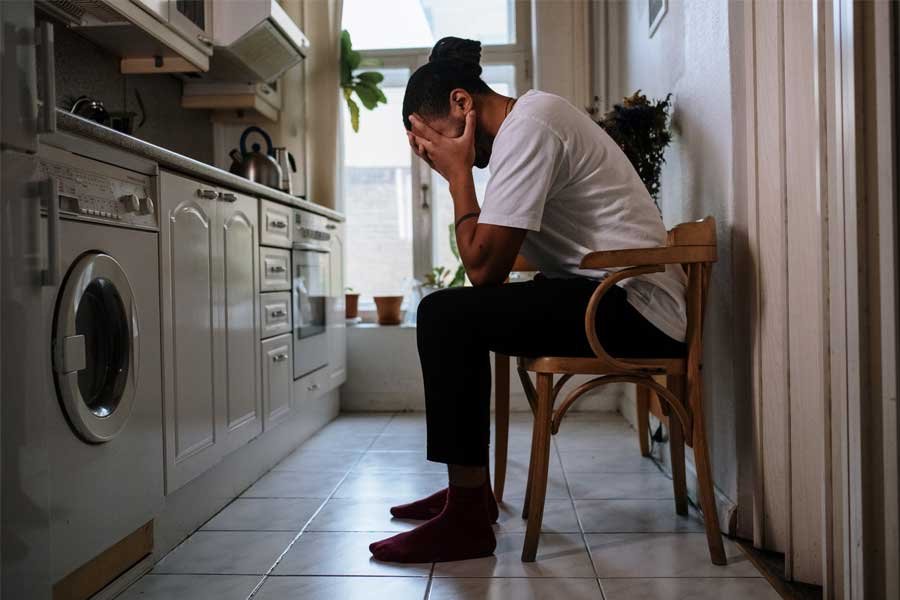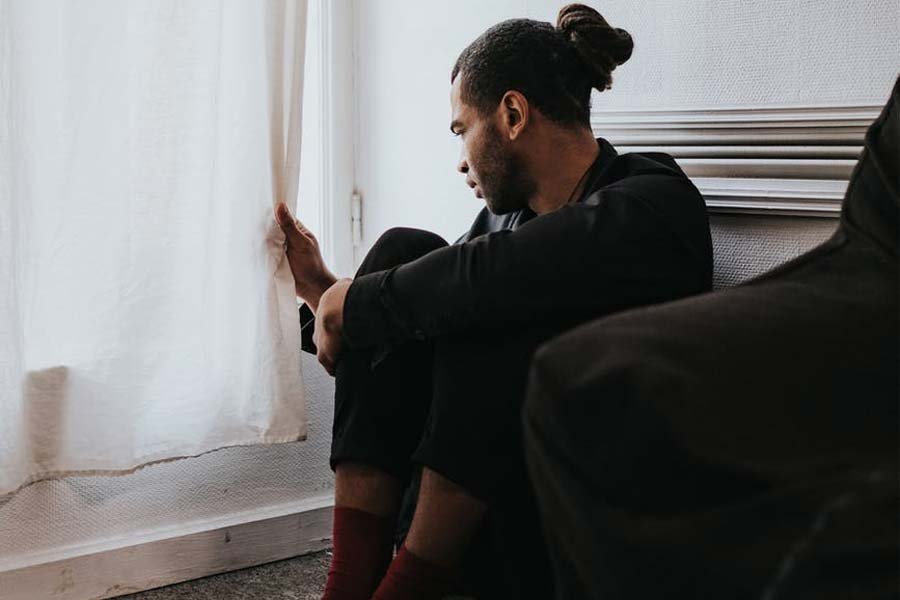Agoraphobia is a mental health problem that is often misunderstood. People with this anxiety disorder fear heading into crowds or open spaces. The anxiety stems from the worry that escape might be impossible or no one would be able to help if something went wrong in one of these situations. People with agoraphobia may be apprehensive about taking public transportation, standing in line, walking across a parking lot or being a spectator at a sports game.
The dread comes up almost every time that someone with agoraphobia is exposed to the situation. The level of panic that they experience is out of proportion with the threat. If someone has a dual diagnosis of panic disorder and agoraphobia, they have intense panic attacks when their anxiety comes up. People with agoraphobia need treatment, coping skills, education and support to help them live a fulfilling life without fear.

We help you find your psychologist
Online therapy options for agoraphobia
The process of going to in-person therapy can send someone with agoraphobia into a panic. Crowded waiting rooms, parking lots and public spaces feel unsafe.
Online therapy is ideal for individuals with this disorder. As long as someone has access to the internet, they can work with a therapist virtually.
Some benefits of online agoraphobia treatment include:
• Get treatment in the comfort of your home
• No commute
• No need to mingle with strangers
• Helps build confidence in a safe environment
There are several types of evidence-based treatment options for agoraphobia. Online therapists may use one or more of the following approaches to help you get your life back.
Cognitive behavioral therapy
Cognitive behavioral therapy, or CBT, is a treatment option that addresses the influence of thought patterns on behavior. People with anxiety disorders often have unhelpful, intrusive thoughts. The thoughts often lead them to believe that they are likely to die of a panic attack if they go into a public space. If they’re in a crowd or an open area, they think that help won’t be available if they go into panic mode.
Individuals with this disorder aren’t always aware of their thought patterns. To them, it may feel as though the fear hits them full force, bypassing any rational thought. That’s because your brain is wired to respond a certain way to triggering thoughts. Cognitive behavioral therapy aims to create new neural patterns, disengaging channels of problematic thinking that are linked with the body’s fight-or-flight response.
With cognitive behavioral therapy, patients gain awareness of their thought patterns. They learn to evaluate the validity of their thoughts.
For example, patients with panic disorders usually experience physical symptoms of anxiety, such as chest pain, heart palpitations and shortness of breath. These uncomfortable reactions may lead to a downward spiral of negative thoughts. During a panic attack, someone may worry that they’re going crazy or at imminent risk of dying.
Through cognitive behavioral therapy, a patient has a chance to step back from the intensity. They learn that their feelings are not necessarily true facts. They also develop skills to manage their physical and psychological symptoms without letting them take over their life.
A 2018 review and meta-analysis found that online cognitive behavioral therapy is just as effective as in-office treatment. Many CBT methods require the patient to reflect on their thoughts and behaviors. CBT usually involves homework and writing assignments that can be done on the patient’s time. An internet-based platform gives clients plenty of time to consider their therapist’s advice and work on the strategies that they have learned.
Relaxation techniques
When you’re in the midst of a panic attack, you often think in black and white. In fact, everything may turn to darkness. The only thing that you can think about is dying or losing control.
Relaxation techniques can help you reduce anxiety over time. They can also be used to calm yourself down when you’re in acute distress. Relaxation skills may not be enough to combat agoraphobia on their own. However, when they’re practiced consistently as part of a comprehensive treatment plan, relaxation techniques help you:
• Reduce tension and stress in your body
• Lower blood pressure, respiration rate and heart rate
• Increase your awareness of physical anxiety symptoms
• Calm and manage racing thoughts
• Stay calm when you’re exposed to triggering situations in the future
A relaxation practice is like an exercise regimen. It works best when you use it consistently. Learning to relax allows you to regulate your central nervous system, which is responsible for the panicky feelings that arise from your agoraphobia.
If you have tried yoga or meditation with no results before, you might need to try a different approach to relaxation. An online therapist is trained in a wide variety of techniques. A professional will help you develop a practice that works for you.

We help you find your psychologist
Eye movement desensitization and reprocessing
Eye Movement Desensitization and Reprocessing, or EMDR, is a structured therapy that changes the way that the brain processes past experiences. It was developed in 1987 to treat people with PTSD. The technique is now used for a wide variety of psychological disorders and emotional distress.
During EMDR, the client is guided to access memories that are related to a traumatic or emotional experience. As they do, they are exposed to bilateral sensory stimulation. This might involve moving the eyes rhythmically, holding paddles that buzz in each hand or listening to certain tones.
EMDR can be performed over the phone or the internet. It’s best to do it in real time with your therapist. However, the technique can be taught to patients so that they can do it on their own.
Still, it helps to work with a therapist while you’re undergoing EMDR. A mental health professional will help you identify the target of the trauma. For people with agoraphobia, the target is often a situation in which they experienced extreme anguish after going out in public or an open space.
The therapist knows how to respond if you feel distress while you’re participating in EMDR. Your counselor will also evaluate your progress. EMDR usually helps clients reprocess memories and find emotional and psychological relief within three to eight sessions.
Support groups
It’s not always easy to talk to your friends and loved ones about your mental health issues. Others usually don’t understand the depth of your anxiety. They may give you unhelpful advice, such as telling you everything is going to be ok or you should just push through the fear. If you have agoraphobia, you can’t just talk yourself out of it.
Support groups can help you meet peers who are going through similar issues. Validating your experience can help you gain control over your emotions. Hearing others share in a support group can give you hope. You’ll learn what coping skills have worked for other people and listen to success stories.
Online support groups let you connect with others from a safe space. They also offer a level of anonymity that isn’t possible in person. Support groups aren’t usually a replacement for therapy. However, they can help make counseling more effective.
Is there an App for that?
There are countless apps for people who struggle with agoraphobia. Some of the best types of apps include:
• Relaxation and meditation apps help you practice coping skills that you can use when you feel a panic attack coming on.
• Journaling apps allow you to keep track of your symptoms and experiences.
• Panic disorder and agoraphobia apps usually offer a range of features to track your anxiety, desensitize yourself to triggers and guide you through coping skills.
• Online therapy apps give you access to a mental health professional for regular counseling sessions.
These apps and services aren’t usually free. However, they’re often more affordable than an office visit to a mental health professional. Check with your insurance to find out whether they’ll cover the costs of an app that can help relieve your agoraphobia symptoms.
I’ve started, So i’ll finish
If you have read this far, you might as well check out some of the options for alleviating your agoraphobia symptoms. This task may seem daunting, but you can research online therapy options anonymously from home.
Getting some momentum behind you can boost your chances of success with online therapy. This doesn’t mean that you have to push yourself to the limit or force yourself to face your mental health issues. However, it does imply that baby steps can launch you in the right direction.
You have taken the first step and learned that you have convenient, affordable options for therapy. Your next step could be researching some of those options. Online therapy platforms such as BetterHelp have clear, informative FAQ sections. Websites that are transparent and give you details about every aspect of their services help you narrow down your choices.
When online therapy is a click away, it becomes an easy step to take in the right direction. In many cases, you can get started within 24 hours after registering and paying for the service.

We help you find your psychologist
Don’t forget
You don’t have to manage your agoraphobia alone. Getting education and guidance from an experienced professional will help you take control of your life. There are many science-backed treatment options that deliver successful results.
Every time you have a panic attack or feel unsettled, you are solidifying the pathways that connect those experiences with fear. Anxiety becomes harder to treat as it grows. Give yourself a chance to enjoy your life again by signing up for online therapy for agoraphobia.

We help you find your psychologist




